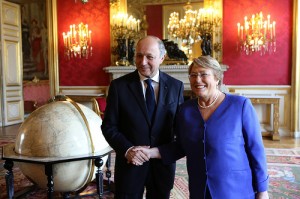Press Statement by UN Women Executive Director after signature of MoU with French Government
Statement of Michelle Bachelet after signing a Memorandum of Understanding with the French Government in Paris, France May 24, 2012.Date:

Mesdames, Messieurs Bonjour!
First of all,
I would like to thank the Minister of Foreign Affairs, Laurent Fabius, for having me here to sign the Memorandum of Agreement with UN Women (ONU Femmes).
In politics, we need equality, and Governments should lead by example.
So, I truly congratulate France for gender parity in the new Cabinet!
I encourage every country to use special temporary measures to achieve gender balance and parity in parliament and public office and the private sector.
I welcome the signing of this agreement, which strengthens our cooperation to put women's and girls' empowerment and equality on top of the national, European and global agenda.
This agreement covers several areas of engagement from increasing women's leadership and participation, to ending violence against women and girls, to eliminating all forms of discrimination against women, both in terms of legislation and in practice.
The agreement also commits us to work together to advance women's economic empowerment, their active engagement in peace and security and their right to sexual and reproductive health, and to promote gender responsive planning and budgeting so that policies and programmes benefit men and women, and girls and boys equally.
Today's signing of the Memorandum of Agreement is vital to ensure that every woman and girl can live free of violence, coercion and discrimination, and women can play their full and equal role in societies, economies and in advancing peace and security.
As victims of domestic violence or as victims in conflict, women and girls have emergency and immediate, practical and life-saving needs that must be met as a bottom line measure of any society's commitment to human rights, dignity and democracy.
Globally country data shows that 15 to 76 percent of women report having experienced gender-based violence at some point in their lifetimes.
Violence against women is a gross human rights violation, and it comes at a high cost—translating into billions of dollars every year accounting for healthcare, police and legal services and productivity loss.
France has always been a great defender of human rights and contributor to peace throughout its history. We know that women are more than victims, they are active agents of peace and stability. We think it is essential that women are actively involved at peace processes, because they are impacted severely and differently by any conflict.
From Afghanistan to Cote d'Ivoire, war harms women in multiple ways: from mass rapes to mass displacements. Women are on the frontlines of conflict and they are also on the frontlines of ensuring well-being for their families, communities and nations.
Yet both their roles and rights continue to be overlooked at peace negotiations.
Our studies show that since 1992, less than 8 percent of peace negotiators have been women; less than 6 percent of reconstruction budgets specifically address the needs of women and girls or promote their empowerment.
We hope we will work hand in hand to change that. Advancing women's rights is not some self-serving agenda of activist women. It is a necessity if we are serious about equality, and building healthy and inclusive economies and societies. This is what we owe to current and future generations.
In France your maxime is Liberté, Egalité, la Fraternité.
Pour qu'il y ait la Liberté, Egalité, la Fraternité, il faut l'égalité des sexes !
Je vous remercie.
I thank you and I look forward to your questions.
Related Links:
- Photo Gallery: Michelle Bachelet visit to France
- Press Statement by UN Women Executive Director at the OECD Ministerial Council
- Statement by UN Women Executive Director at OECD on building partnership for equality
- Press Release: UN Women and the International Organization of La Francophonie (OIF) sign a framework cooperation agreement
- UN Women Executive Director visits France to strengthen global partnerships for equality